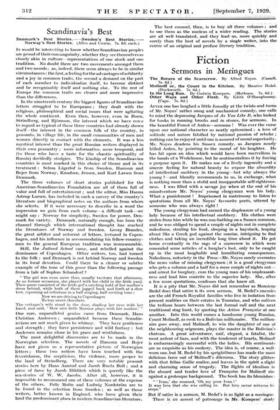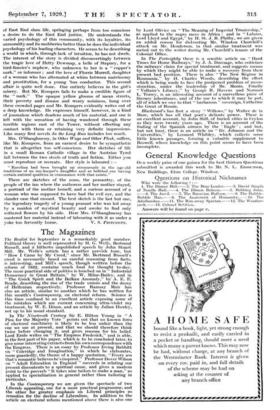Fiction
Sermons in Meringues
AFTER one has laughed a little forcedly at the twists and turns of Mr. Noyes' rather smug and mechanical comedy, one calls to mind the depressing Jacques of As You Like It, who looked for books in running brooks and in stones, for sermons. In the beautiful Forest of Arden—sermons ! Was ever the curse
upon our national character so neatly epitomized ; a love of solitude and nature falsified by national passion of rebuke ; nothing can be enjoyed until one is assured of moral superiority.
Mr. Noyes deadens his Sussex comedy, as Jacques nearly killed Arden, by pointing to the moral of his laughter. He has hit upon an idea which would have been marvellous in the hands of a Wodehouse, but he sentimentalizes it by forcing a purpose upon it. He makes use of a lively ingenuity and a sincere feeling for natural beauty to expose the absurdity of intellectual snobbery in the young—but why always the young ?—and blandly recommends to us, in exchange, what is nothing more than a stolid and insupportable self-righteoni- ness. I was filled with a savage joy when at the end of his misadventure Mr. Noyes' young clergyman won his lady. What a punishment ! Imprisoned in matrimony to listen to quotations from all Mr. Noyes' favourite poets, uttered by someone who was always right !
The young clergyman had earned the displeasure of a young
lady because of his intellectual snobbery. His clothes were stolen from him while he was sun-bathing on a Sussex common, and he was obliged to spend a couple of nights out in complete nakedness, stealing his food, sleeping in a haystack, leaping about like a Greek god against the sunrise, intriguing to find clothes and taking an incredible long. time about it. He got home eventually in the rags of a scarecrow in which were concealed some articles of a burglar's loot, only to be caught up in the most laughable and humiliating consequences. Nakedness, notoriety in the Press—Mr. Noyes surely overrates the news value of missing clergymen ; it is a good clergyman who gets a column and a half for a mere couple of nights out— and arrest for burglary, cure the young man of his unpleasant- ness and lead him contrite to the superior lady. She,. after
a few more quotations, confesses that she knew all.
It is a pity that Mr. Noyes did not remember as Monsieur
Bedel does that satire is its own sermon, M. Bedel's enemies are the old French Royalist families who live in isolation from present realities on their estates in Touraine, and who enliven the tedious hours between the last formal call and the next traditional stag hunt, by quoting the Action Francai,se at one another. Into this world comes a handsome young Russian, Count Molinoff, as cook to a Bolivian millionaire. The million- aire goes away, and Molinoff, to win the daughter of one of the neighbouring seigneurs, plays the master in the Bolivian's chateau. A great adventurer, naif, elegant, a fatalist, the most ardent of liars, and with the tenderest of hearts, Molinoff is embarrassingly successful with the ladies. His sentiments are as exquisite as his cookery. The idea is, of course, a well-
worn one, but M. Bedel by his sprightliness has made the most delicious farce out of Molinoff's dilemma. The story glitters with that feline Gallic malice, and leaves in the spirit a slight
and charming sense of tragedy. The flights of idealism in the absurd and tender love of Franeoise for Molinoff rise against a grotesque background. The book has its blemishes : " Ivan,' she moaned, 'Oh my poor Ivan ! '
It was love- that she was calling to. But love never retraces bit steps."
But if satire is a sermon, M. Bedel's is as light as a meringue. There is an accent of-patronage in Mr. -Kompers' study
of East End slum life, springing perhaps from too conscious a desire to do the East End justice. He understands the varied psychology of this community, with its loyalties, its immorality and its snobberies better than he does the individual psychology of his leading characters. He seems to be describing a world in which, through lack of intuition, he has not dwelt.
The interest of the story is divided disconcertingly between the tragic love of Hetty Dewsnap, a belle of Stepney, for a bird-fancier's nephew, who unknown to her is a " copper's nark," or informer ; and the love of Florrie Murrell, daughter of a woman who has alternated• at .whim between matrimony and prostitution, for a young 'bus conductor. This second affair is quite well done. One entirely believes in the girl's misery. But Mr. Kompers fails to make a credible figure of the " nark." The opaque yellow glooms of mean streets, their poverty and disease and weary noisiness, hang over
these crowded pages and Mr. Kompers evidently writes out of a deep knowledge. He expresses himself, however, in a kind
of journalese which deadens much of his material, and one is left with the sensation of having wandered through these terrible regions east of the Tower, without effecting any contact with them or retaining very definite impressions. Like many first novels In the Long Run includes too much.
Mrs. O'Shaughnessy, in Other Ways and Other Flesh, suffers, like Mr. Kompers, from an earnest desire to be sympathetic that is altogether too self-conscious. Her sketches of life in a small Roman Catholic village in the Austrian Tyrol fall between the two stools of truth and fiction. Either you must reproduce or recreate. Her style is laboured :--
" Karolina had been brought up strenuously in the age-old traditions of an inn-keeper's daughter and as befitted one having certain natural qualities in consonance with that estate."
There are sketches of the nuns, the peasantry, of the people of the inn where the authoress and her mother stayed, a portrait of the mother herself, and a curious account of a woman who was supposed to have had the evil eye, and the slander case that ensued. The best sketch is the last but one, the legendary tragedy of a young peasant who was led away by a maiden of mystical beauty and awoke to find only withered flowers by his side. Here Mrs. O'Shaughnessy has mastered her material instead of labouring with it as under a

































 Previous page
Previous page